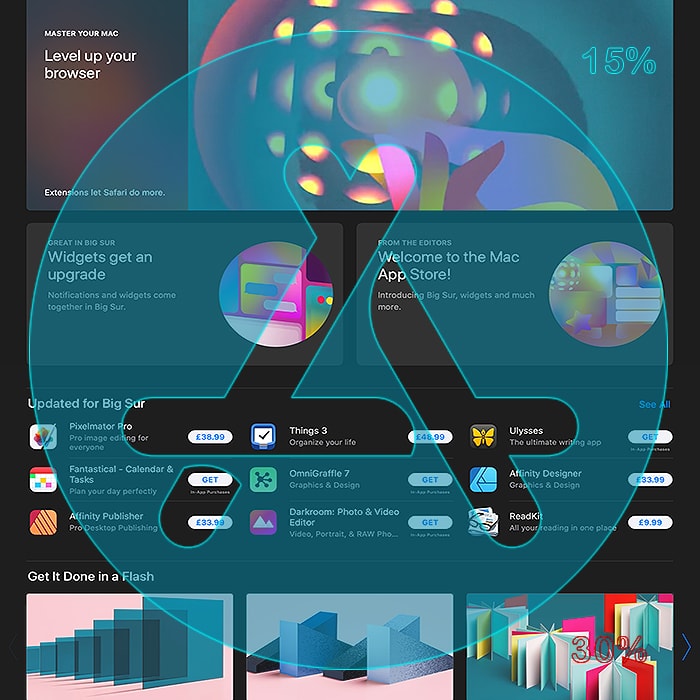Too Many Apps?

The average smartphone user has between 25 and 100 apps installed on their phone - I happen to have a rather more elaborate 253 currently. Regardless of numbers, the typical user only really uses 25 of those apps regularly. We have discussed the pros and cons of native apps versus responsive-design websites in the past - the key differences between browser bookmarks and stand-alone utilities.
In light of better privacy controls coming to browsers (e.g. Safari 9) - which allow users more and better control over their onsite experience - particularly when it comes to advertising, the question is ’have certain types of apps had their day’?
Recent news articles have highlighted issues with advertising concerning apps in two ways - firstly the use of interstitial apps on websites to encourage users to ’Download the App’ for a better experience. Secondly, there has been an enormous increase in advertising fraud within apps - where impressions are recorded, but no ads shown - costing the advertising industry millions per annum. Fraud detection firm Forensiq registered up to 20 unseen ads per minute, consuming 2GB of data per day, over a 10 day period. The truth in all of this is that ads are very much unwanted by consumers, an interruption and annoyance - which most would rather do without. There are so many tools and obstructions now for advertisers that the question is increasingly becoming whether the banner format has not just reached the end of its natural useful life, and needs to be replaced with something more congenial (like native advertising)?
For those who really don’t like ads then, it would seem preferable to simply block 3rd party cookies on your browser and go with the responsive version over the app. Apps themselves have become more and more devious over the years too, with most now relying on a plethora of different revenue streams, skewing very much in favour of in-app purchases as the primary means of funding. I personally have always preferred to have fixed / known costs, and would rather pay say £9.99 for a fixed cost app, rather than download something free with paid-for upgrades costing up to $100 a pop.
In view of what happened with Zynga and how many free + in-app payment scenarios ruined the playing experience of former best-selling games, it is most intriguing to follow the uptake of the new Angry Birds 2 game. Rovio were the ones who famously pioneered the £0.69 all-in app with their quintessential original mobile game. The new version though is most definitely freemium / in-app payment supported (max bundle at $£€40), which as I said previously has often ruined the gameplay for many a formerly successful franchise - Plants vs Zombies included (IHO).
To maximise revenue potential - should gaming companies not always therefore make available two different versions - one freemium with in-app payments, and a separate all-in version sold at a premium rate. Parents with kids, and the more cost-conscious of us can buy the latter, knowing that the costs are fully contained and safe, while everyone else can buy the former.
The whole idea of casual gaming is that you can carry on with your game at any time and any place - having to endure 30 minute time-outs or continually pay for ’extra beans / crystals / whatever’ totally ruins the gaming experience for me. Also having to pay over the odds for a casual gaming experience has equally detrimental effects. There are relatively few games which get the freemium balance just right - all too often things become way too difficult on the second or third level - meaning the only way you can continue / complete said games is to keep buying power-ups and lifelines ad infinitum.
I was at Busaba Eathai with my niece on Wednesday, and they were advertising their new app, which allows you to pay for your meal from the app itself, foregoing the need to summon a waiter / waitress and wait for the bill to arrive, and then summon whoever is in control of the card machine. As an incentive it offered £5 off the bill - yet somehow in the process of my paying the bill with the app, the actual screen featuring the function to redeem said discount was no longer available! Busaba is somewhere I drop in every couple of months or so, should I really have their App on my phone? Will all restaurants be following this pattern - which surely can’t work. If you have a few regular / possibly local restaurants too, then it can make sense to have an app which speeds up the payment process - even better if you can make drinks orders etc. through it. If you’ve ever been to Inamo on Wardour Street, they have totally nailed the whole ordering and payment process by building an app into every dining table. Trying to get a waiter’s attention at most restaurants is usually a tricky task, so there are real benefits in apps which make the food ordering and payment process simpler and more efficient.
The big question raised in all of this is what is the upper limit for Apps? Surely my 253 must be near a manageable upper limit - I could not possibly download an app for every single store, restaurant, amenity and service I use. At one time I had nearly 100 games on my phone, now I limit those to a maximum of 18 (only 14 currently on phone). There is of course another science entirely - on how to arrange your apps - how many folders to employ, pages vs folders, logical groups vs usage occasion - all of my apps are deftly and logically clustered together, but there are some within each cluster that I rarely use - the intention is there, but the moment never quite seems to materialise.
There are many reasons for service providers not to create Apps - especially for commercial businesses who have to pass on a cut to the relevant app store. As consumers get to effect more control through their browsers, it is increasingly in both parties’ interests to go direct - and cut out the middle-men. For sure app stores will always be appealing storefronts for games and leisure pursuits, but I can’t help feeling that many industries - publishers in particular, aren’t better off ditching Apps as far as they can, and just running everything through responsive / HTML5 ...

Did you find this content useful?
Thank you for your input
Thank you for your feedback
Upcoming and Former Events
Affino Innovation Briefing 2024
Webinar - Introduction to Affino's Expert AI Solutions - Session #2
Webinar - Introduction to Affino's Expert AI Solutions - Session #1
PPA Independent Publisher Conference and Awards 2023
Meetings:
Google Meet and Zoom
Venue:
Soho House, Soho Works +
Registered Office:
55 Bathurst Mews
London, UK
W2 2SB
© Affino 2024

















